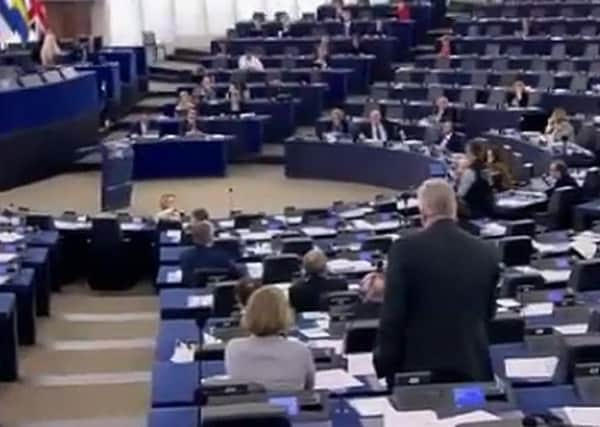Jim Nicholson: The European Union will be in flux until later this year so don’t expect early trade deal


The reality is that this turbulent period will not end on the 29th March — or whenever the date of our departure ends up being.
Both sides have been keen to stress that talks on our future trading relationship with the European Union can start from the day after we leave. But let us look realistically at the timescale.
Advertisement
Hide AdAdvertisement
Hide AdBy mid April, the European Parliament will close ahead of the elections, and we will be dealing with a lame duck European Commission.
When the parliament returns in July, these weeks will be taken up by reconstituting political groups, distributing places on parliamentary committees, followed by a recess for the month of August.
In the autumn, hearings will be held to approve the new commissioners and the parliament will vote on the commission in October.
I believe therefore we won’t seriously be talking about trade until December 2019 or January 2020.
Advertisement
Hide AdAdvertisement
Hide AdThis is before we factor in the fact that the European Parliament will look very different to how it currently looks — and not just because the UK will no longer be represented.
The far right could well end up forming one of the largest groups — in fact it is predicted that Italy’s governing party the league could be the largest single national party in the parliament, which would send shockwaves throughout Europe.
One common myth or misconception is this rise in populism on the continent would make the EU more amenable to compromise with the UK.
In fact, it could well herald an even more stubborn — and ultimately counter-productive — stance.
Advertisement
Hide AdAdvertisement
Hide AdWe have already seen evidence of that from French President Emmanuel Macron.
He is under intense pressure from all sides and the ‘yellow vest’ protests have threatened to derail his presidency.
Yet this week in the aftermath of the government’s crushing defeat in the House of Commons, he railed against the UK and pledged to defend French fishing interest in any future relationship talks.
Similarly in Spain, politicians are resorting to making threats over Gibraltar which could derail progress.
Advertisement
Hide AdAdvertisement
Hide AdThese are just two examples but they are significant — remember, any one of the twenty seven remaining EU states can block progress in future relationship talks, or even keep us in the backstop were that ever to be agreed.
Of course efforts have been made to assure us that this will not happen, but a new political landscape on the continent makes these efforts even less tenable.
It is unlikely that those chiefs making these assurances will still be in post.
The reason this is of particular importance is that both the government and the European Union have been at pains to stress that the backstop will not or should not be needed.
Advertisement
Hide AdAdvertisement
Hide AdThe timeline above shows that nearly a year of our transition period will be spent on personnel changes.
Even factoring in an extension of the transition period, should the government decide it wishes to do so, it is simply naive to think a fully-fledged deal will be done on time to prevent the backstop from kicking in.
So I would say, and I take no joy in saying this, do not hold out hope for a quick trade deal.
In reality we will be continuing to discuss Brexit for many months and years to come.
Advertisement
Hide AdAdvertisement
Hide AdIt may seem hard to believe now, given that the government lost the vote on its deal by some 230 votes, but getting the Withdrawal Agreement approved could well prove to be the easy part in the long term.
Whatever happens — whenever and however we leave the EU — only a very brave person could predict what the final outcome will look like.
• Jim Nicholson has been an Ulster Unionist MEP since 1989